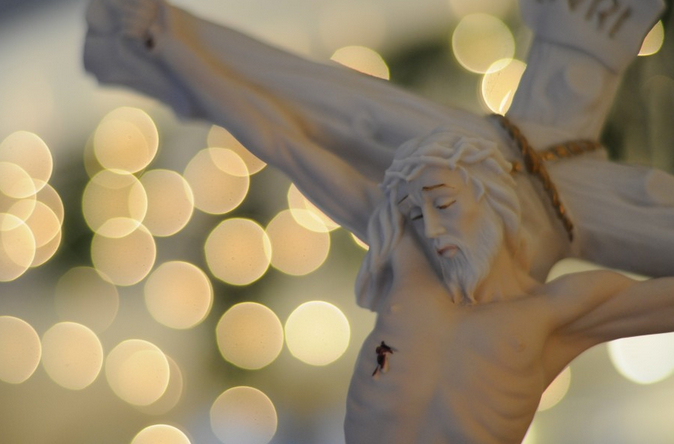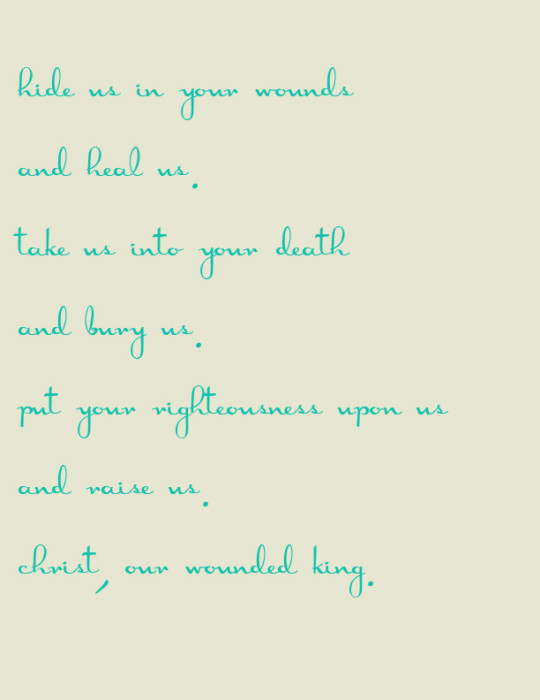For I was determined to know nothing among you, except Christ, and Him crucified. 1 Cor. 2:12

There’s a new wave of churches taking root in America and abroad that may surprise you—the athiest mega-church. This fascinating article about this movement starts like this:
It looked like a typical Sunday morning at any mega-church. Several hundred people, including families with small children, packed in for more than an hour of rousing music, an inspirational talk and some quiet reflection. The only thing missing was God.
These groups of athiests gather to hear good music, inspirational speaking about ways to become better people, and then are sent out to fight social injustice. Craig Parton points out that, unfortunately, they take their cues from American pop Christianity, which has been doing this same thing for years, only with a little God thrown in. He points out that the one thing often missing from many Christian church services is Jesus and the scandal of the cross.
Martin Luther first coined this phrase, the theology of the cross, in the Heidelberg Disputation, but many descendants of the Reformation may have never heard the term.
What it means is this: When I want to know how it is between God and me, I must look to the cross.
Everything for the christian must be viewed through the lens of this one, pivotal event. That is our center point, the hinge of our faith. We must know God there or we will not know Him aright. Jesus dying on the cross is the beginning of Christian theology. Our natural theology, a theology of glory, says that I can know how it is between God and me by looking at my life, my circumstances—in other words, a ‘me-centered’ theology.
And we do this all the time without thinking about it.
When we lost our home to fire in December of 2010, I couldn’t help but struggle with doubt. Why us? Why this? Why now? Where is God in this tragedy? It’s hauntingly similar to what Jesus uttered on the cross, when he said, “My God, my God, why have You forsaken me?” And even though this question came from the lips of the Son of God himself, the heavens were silent. The cross stands as God’s final answer to all our ‘why’ questions.
The cross speaks across the centuries, across every barrier, and shouts to us in our suffering. The God who suffers unspeakable grief, loves us and gives Himself over to death on our behalf. The cross gives meaning to our suffering, to our doubt. The song of redemption rings loud and clear from the mouth of the suffering Savior as He speaks forgiveness.
But, we are theologians of glory. We have replaced the cross with everything under the sun. We don’t want its shame. We want to believe that man is basically good and his faults can be overcome by moral improvement, powerful spiritual experiences, or intellectual ascension. Maybe we sense that God is angry with us and we believe there is something we can do to appease that anger. We turn the Scriptures into a How-To manual and spend our lives climbing ladders to God. The most popular ladder in the past twenty years seems to be the mystical ladder of experience-based faith and worship. We chase spiritual worship experiences in order to feel connected to God. We’ve become masters at the carefully tailored worship service—so much so that the athiests can copy us and have their own inspirational services, often without changing much of anything.
But, Jesus offers us all He has at the cross. He delivers the salvation and forgiveness won for us there on Sunday morning in the preaching of the Gospel and the administration of The Lord’s Supper. And where those two things are missing, what we’re often left with is music and teaching that is designed to inspire and motivate, or worse manipulate. The preaching of God’s law and Gospel are not meant to inspire us, but to kill and make alive. The law, preached in its fullness leaves us no wiggle room to justify ourselves. We have sinned and are the enemies of God. The Gospel rescues us with finished work of Christ on the cross. It is finished still rings through the ages.
The theology of the cross is the theology of Scripture.
And when we forget, we live as slaves to our circumstances. We try to figure out where we stand with God by looking all around us or by looking into our bank accounts or our 401K’s. We want some tangible sign—hopefully in the form of health, wealth or fame, or some mountain top spiritual experience—to know that God is pleased with us.
But, there is one sure way to know where we stand with God—a signpost rooted firmly in the Scriptures that never changes.
It’s called a cross.
When you look at the cross, you can know exactly where you stand with God. At the cross, you don’t have to wonder whether or not you’re measuring up. You don’t have to wonder if you’re “spiritual enough.” You don’t have to worry if your sin has been too great. Your sin and your righteousness alike fall away here. You don’t have to battle the demons that rage against you and make you question whether or not God brought this suffering your way. He has crushed your demons, your sin, your self-righteousness, and your doubt, and He has taken your suffering into His own body. He has answered every accusation against you. Every single one.
Here, at the foot of this cross, the God of the universe has crawled into your skin, into your suffering, into your doubt and has rescued you from death, hell, and every snare of the Enemy. This is the place where you must learn to take refuge. Here, at the cross, you know you are loved with a love that will never fail. This is the perfect love of God on display for you.
This is your sign.
We can go almost anywhere and hear good music and inspirational speeches. We can venture out into nature and know there is a God. God may, indeed, be everywhere, at all times. He is certainly the author of all good things. But only here, at Calvary, can you know Him in love and mercy.
Only at the cross—where Jesus stretches out His arms forever, to the ends of the earth, in love for all mankind—do you know that God is for you.
Beautiful are the feet of those who bring us this good news.
I remember when our pastor made the sign of the cross on my little one’s forehead and on her heart when she was baptized, to mark her as one redeemed.
He has marked us with His cross forever—the sign from heaven that all has been renewed and all is well.

If you’re new around here? Thank you for visiting my blog! I’m honored you’re here and I hope you’ll find some encouragement (and some laughter!) for your days. Visit my about page, which highlights some of my popular posts or will at least show you a peak into my crazy people. You can subscribe to this blog by email here. I am currently addicted to Pinterest, so follow at your own risk. I also post updates to Facebook, Instagram, and Twitter.


 Well, okay, one more, since you begged.
Well, okay, one more, since you begged. 2. Memory Lane, 2.0
2. Memory Lane, 2.0






















